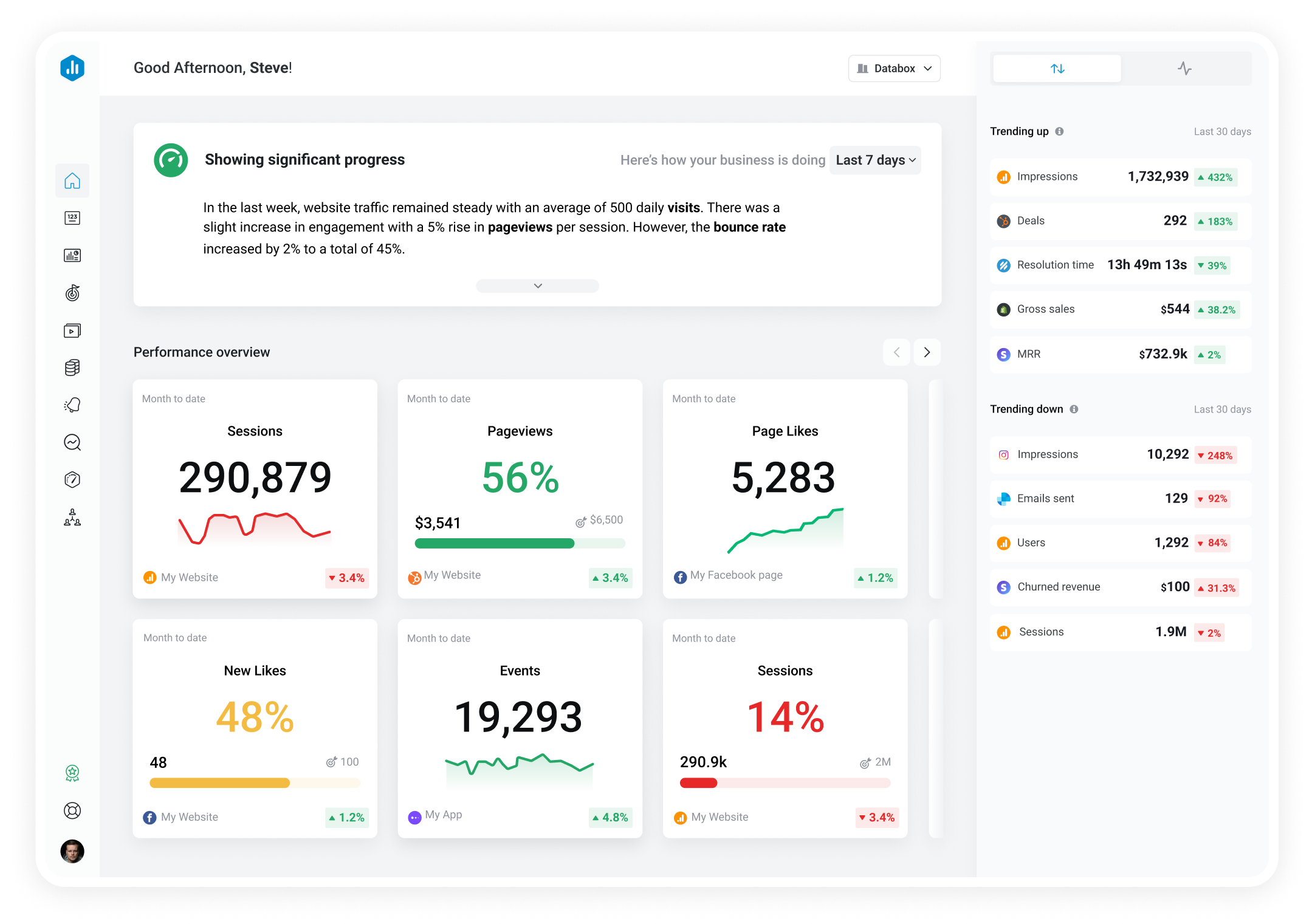Track all of your key business metrics from one screen
GET STARTED
 QuickBooks
Net Operating Income (Cash)
QuickBooks
Net Operating Income (Cash) Net Operating Income (Cash) is a profitability metric that reflects the income generated by a business's operations after deducting operating expenses and taxes but before deducting interest and other non-operating expenses.
With Databox you can track all your metrics from various data sources in one place.
Net Operating Income (NOI) is a financial metric used to measure the profitability of an income-generating property or business.
It’s primarily used in real estate investing and property management, where it represents the income a property generates after deducting all operating expenses.
Net operating income is calculated by subtracting operating expenses from the total income a specific property or business generates.
In real estate, operating expenses typically include property taxes, insurance, maintenance and repairs, utilities, management fees, and other costs directly associated with operating the property.
Here is a simple formula you can follow:
NOI = Total Income – Operating Expenses
Let’s say you own an apartment building and want to calculate its net operating income for the year.
The apartment building generates $200,000 in rental income for the year and the operating expenses amount to $80,000.
Using the formula, we can calculate that the net operating income for the apartment building is $120,000 for the year.
It’s important to note that this metric does not take into account financing costs such as mortgage payments or income taxes. These factors are excluded from the calculation to focus solely on the property’s operational performance and its ability to generate income.
The definition of a “good” net operating income depends on factors such as the industry, location, and specific circumstances of the property or business.
However, there are some general benchmarks that can be considered when evaluating NOI across different industries.
Note that these figures are approximate and can vary significantly based on the factors we mentioned above.
In the real estate industry, it’s important to consider the type of property.
For example, in the commercial real estate sector, a good net operating income is typically considered to be around 70% to 75% of the property’s gross operating income. In other words, the operating expenses account for approximately 25% to 30% of the total income generated.
For multifamily properties such as apartment buildings, a good net operating income is often considered to be around 50% to 60% of the gross rental income.
In the retail business, a good net operating income can vary depending on factors such as the type of retail operation (e.g., small storefront, shopping mall), location, and the specific retail segment. Generally, a good NOI is from 15% to 30% of the gross sales revenue.
Effectively managing operating expenses is one of the best ways for businesses to increase net operating income – but it’s not the only one.
In the competitive landscape, it’s important to think creatively and strategically, so we prepared some tips to help you do just that:
More resources to help you improve:

Used to show a simple Metric or to draw attention to one key number.

Used to illustrate numerical proportions through the size of the slices.

Used to show comparisons between values.
Databox is a business analytics software that allows you to track and visualize your most important metrics from any data source in one centralized platform.
To track Net Operating Income (Cash) using Databox, follow these steps:
 Goals
Goals Scorecards
Scorecards Metric Digest
Metric Digest Metric Builder
Metric Builder Data Calculations
Data Calculations Performance Screen
Performance ScreenOptimize e-commerce with our WooCommerce + QuickBooks dasboad. Monitor Sales Funnel, Performance, Profit & Loss, Revenue, Expenses and Cash Flow metrics for actionable insights


Stay on top of your company’s financial health with real-time P&L, balance sheet, and cash flow insights from QuickBooks. Built for business leaders, finance teams, and stakeholders to support smarter planning and decision-making.

Operating income refers to the profit generated from a company’s core business operations, excluding non-operating expenses such as interest and taxes.
Net income, on the other hand, represents the total profit or earnings of a company after deducting all expenses, including non-operating items. It includes operating income as well as additional income or expenses outside the core operations.
Yes, net operating income is the same as EBIT (Earnings before Interest and Taxes). Both terms refer to a company’s income before deducting interest expenses and income taxes.
Gross operating income refers to the total revenue generated by a property or business before deducting operating expenses.
Net operating income is gross operating income minus operating expenses.
